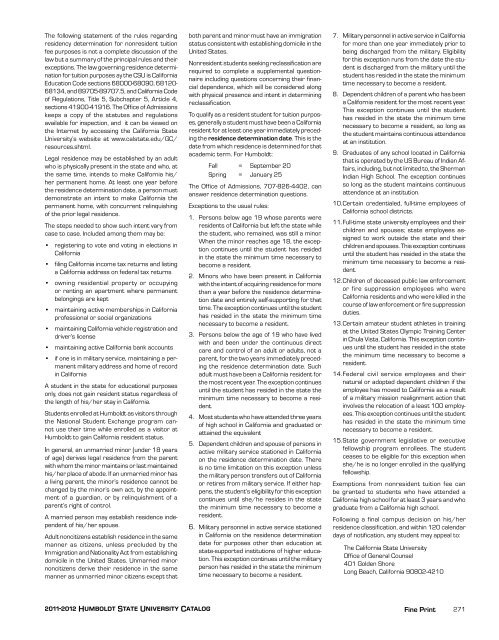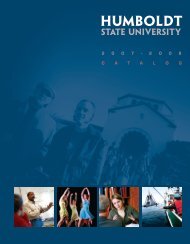2011-12 Academic Year - Bad Request - Humboldt State University
2011-12 Academic Year - Bad Request - Humboldt State University
2011-12 Academic Year - Bad Request - Humboldt State University
Create successful ePaper yourself
Turn your PDF publications into a flip-book with our unique Google optimized e-Paper software.
The following statement of the rules regarding<br />
residency determination for nonresident tuition<br />
fee purposes is not a complete discussion of the<br />
law but a summary of the principal rules and their<br />
exceptions. The law governing residence determination<br />
for tuition purposes ay the CSU is California<br />
Education Code sections 68000-68090, 68<strong>12</strong>0-<br />
68134, and 89705-89707.5, and California Code<br />
of Regulations, Title 5, Subchapter 5, Article 4,<br />
sections 41900-41916. The Office of Admissions<br />
keeps a copy of the statutes and regulations<br />
available for inspection, and it can be viewed on<br />
the Internet by accessing the California <strong>State</strong><br />
<strong>University</strong>’s website at www.calstate.edu/GC/<br />
resources.shtml.<br />
Legal residence may be established by an adult<br />
who is physically present in the state and who, at<br />
the same time, intends to make California his/<br />
her permanent home. At least one year before<br />
the residence determination date, a person must<br />
demonstrate an intent to make California the<br />
permanent home, with concurrent relinquishing<br />
of the prior legal residence.<br />
The steps needed to show such intent vary from<br />
case to case. Included among them may be:<br />
• registering to vote and voting in elections in<br />
California<br />
• filing California income tax returns and listing<br />
a California address on federal tax returns<br />
• owning residential property or occupying<br />
or renting an apartment where permanent<br />
belongings are kept<br />
• maintaining active memberships in California<br />
professional or social organizations<br />
• maintaining California vehicle registration and<br />
driver’s license<br />
• maintaining active California bank accounts<br />
• if one is in military service, maintaining a permanent<br />
military address and home of record<br />
in California<br />
A student in the state for educational purposes<br />
only, does not gain resident status regardless of<br />
the length of his/her stay in California.<br />
Students enrolled at <strong>Humboldt</strong> as visitors through<br />
the National Student Exchange program cannot<br />
use their time while enrolled as a visitor at<br />
<strong>Humboldt</strong> to gain California resident status.<br />
In general, an unmarried minor (under 18 years<br />
of age) derives legal residence from the parent<br />
with whom the minor maintains or last maintained<br />
his/her place of abode. If an unmarried minor has<br />
a living parent, the minor’s residence cannot be<br />
changed by the minor’s own act, by the appointment<br />
of a guardian, or by relinquishment of a<br />
parent’s right of control.<br />
A married person may establish residence independent<br />
of his/her spouse.<br />
Adult noncitizens establish residence in the same<br />
manner as citizens, unless precluded by the<br />
Immigration and Nationality Act from establishing<br />
domicile in the United <strong>State</strong>s. Unmarried minor<br />
noncitizens derive their residence in the same<br />
manner as unmarried minor citizens except that<br />
<strong>2011</strong>-20<strong>12</strong> <strong>Humboldt</strong> <strong>State</strong> <strong>University</strong> Catalog<br />
both parent and minor must have an immigration<br />
status consistent with establishing domicile in the<br />
United <strong>State</strong>s.<br />
Nonresident students seeking reclassification are<br />
required to complete a supplemental questionnaire<br />
including questions concerning their financial<br />
dependence, which will be considered along<br />
with physical presence and intent in determining<br />
reclassification.<br />
To qualify as a resident student for tuition purposes,<br />
generally a student must have been a California<br />
resident for at least one year imme diately preceding<br />
the residence determination date. This is the<br />
date from which residence is determined for that<br />
academic term. For <strong>Humboldt</strong>:<br />
Fall = September 20<br />
Spring = January 25<br />
The Office of Admissions, 707-826-4402, can<br />
answer residence determination questions.<br />
Exceptions to the usual rules:<br />
1. Persons below age 19 whose parents were<br />
residents of California but left the state while<br />
the student, who remained, was still a minor.<br />
When the minor reaches age 18, the exception<br />
continues until the student has resided<br />
in the state the minimum time necessary to<br />
become a resident.<br />
2. Minors who have been present in California<br />
with the intent of acquiring residence for more<br />
than a year be fore the residence determination<br />
date and entirely self-supporting for that<br />
time. The exception continues until the student<br />
has resided in the state the minimum time<br />
necessary to become a resident.<br />
3. Persons below the age of 19 who have lived<br />
with and been under the continuous direct<br />
care and control of an adult or adults, not a<br />
parent, for the two years immediately preceding<br />
the residence determination date. Such<br />
adult must have been a California resident for<br />
the most recent year. The exception continues<br />
until the student has resided in the state the<br />
minimum time necessary to become a resident.<br />
4. Most students who have attended three years<br />
of high school in California and graduated or<br />
attained the equivalent<br />
5. Dependent children and spouse of persons in<br />
active military service stationed in California<br />
on the residence determination date. There<br />
is no time limitation on this exception unless<br />
the military person transfers out of California<br />
or retires from military service. If either happens,<br />
the student’s eligibility for this exception<br />
continues until she/he resides in the state<br />
the minimum time necessary to become a<br />
resident.<br />
6. Military personnel in active service stationed<br />
in California on the residence determination<br />
date for purposes other than education at<br />
state-supported institutions of higher education.<br />
This exception continues until the military<br />
person has resided in the state the minimum<br />
time necessary to become a resident.<br />
7. Military personnel in active service in California<br />
for more than one year immediately prior to<br />
being discharged from the military. Eligibility<br />
for this exception runs from the date the student<br />
is discharged from the military until the<br />
student has resided in the state the minimum<br />
time necessary to become a resident.<br />
8. Dependent children of a parent who has been<br />
a California resident for the most recent year.<br />
This exception continues until the student<br />
has resided in the state the minimum time<br />
necessary to become a resident, so long as<br />
the student maintains continuous attendance<br />
at an institution.<br />
9. Graduates of any school located in Califor nia<br />
that is operated by the US Bureau of Indian Affairs,<br />
including, but not limited to, the Sher man<br />
Indian High School. The exception continues<br />
so long as the student maintains continuous<br />
attendance at an institution.<br />
10. Certain credentialed, full-time employees of<br />
California school districts.<br />
11. Full-time state university employees and their<br />
children and spouses; state employees assigned<br />
to work outside the state and their<br />
children and spouses. This exception continues<br />
until the student has resided in the state the<br />
minimum time necessary to become a resident.<br />
<strong>12</strong>. Children of deceased public law enforcement<br />
or fire suppression employees who were<br />
California residents and who were killed in the<br />
course of law enforcement or fire suppression<br />
duties.<br />
13. Certain amateur student athletes in training<br />
at the United <strong>State</strong>s Olympic Training Center<br />
in Chula Vista, California. This exception continues<br />
until the student has resided in the state<br />
the minimum time nec essary to become a<br />
resident.<br />
14. Federal civil service employees and their<br />
natural or adopted dependent children if the<br />
employee has moved to California as a result<br />
of a military mission realignment action that<br />
involves the relocation of a least 100 employees.<br />
This exception continues until the student<br />
has resided in the state the minimum time<br />
necessary to become a resident.<br />
15. <strong>State</strong> government legislative or executive<br />
fellowship program enrollees. The student<br />
ceases to be eligible for this exception when<br />
she/he is no longer enrolled in the qualifying<br />
fellowship.<br />
Exemptions from nonresident tuition fee can<br />
be granted to students who have attended a<br />
California high school for at least 3 years and who<br />
graduate from a California high school.<br />
Following a final campus decision on his/her<br />
residence classification, and within <strong>12</strong>0 calendar<br />
days of notification, any student may appeal to:<br />
The California <strong>State</strong> <strong>University</strong><br />
Office of General Counsel<br />
401 Golden Shore<br />
Long Beach, California 90802-4210<br />
Fine Print<br />
271

















